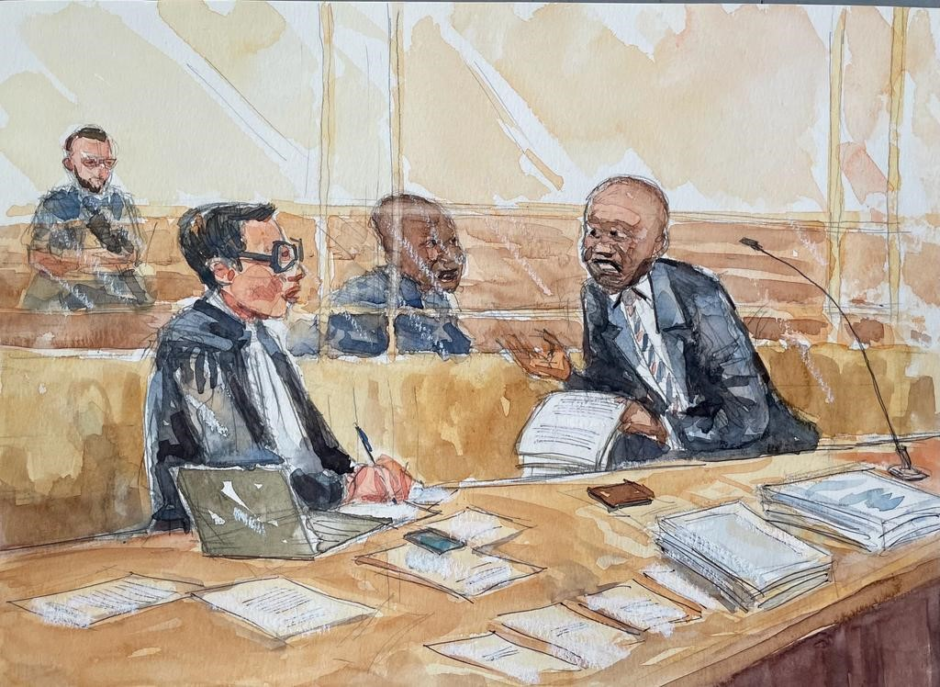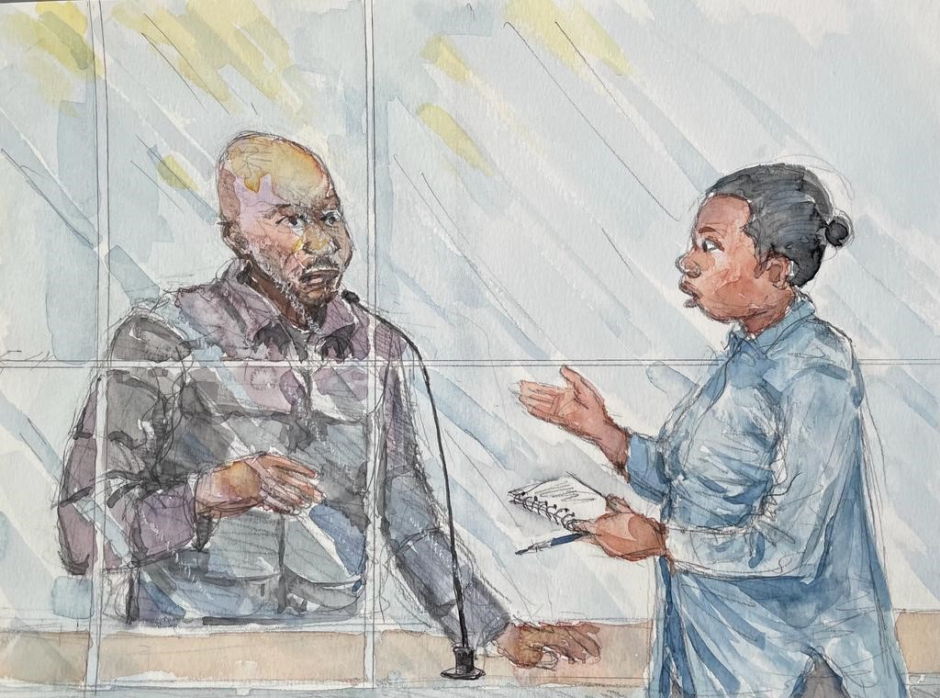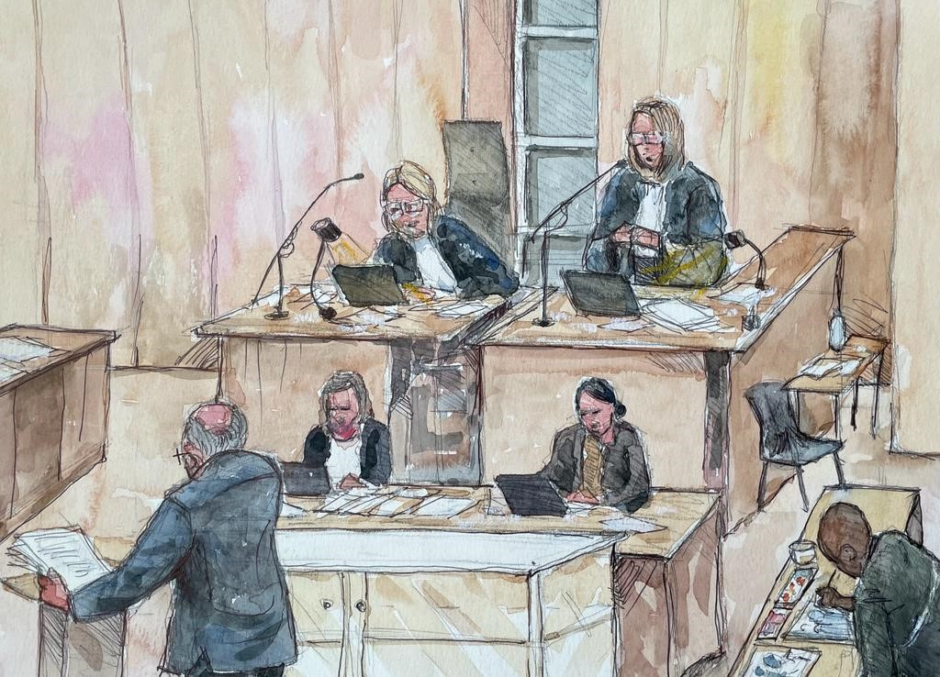
By Prue Clarke with New Narratives
PARIS, France – Day four of the war crimes trial of Kunti Kamara looked closely at the investigations in France and Liberia that produced evidence prosecutors are using in the case against the former commander of the United Liberation Movement for Democracy in Liberia.
Two Liberian leads in the investigation – Luther Sumo, a Lofa prosecutor and Patrick Massaly, Deputy Police Commissioner – testified by video link from Monrovia. They both said that once they had the case material supplied by French investigators they set about finding alleged victims of Kamara in Foya in Lofa County, Liberia and witnesses to corroborate their stories.
The court heard that the Liberian government had not given official approval of the French investigation but the Ministry of Justice had tasked Liberian law enforcement with helping French investigators. French investigators were not permitted to find victims or conduct interviews themselves. They sat in on interviews conducted by Liberians.
Deputy Police Commissioner Massaly, gave graphic detail of the stories his team heard from victims. He collected some statements himself. All witnesses, he said, were clear that the defendant, going by the names “Kunti Kamara” “Co Kundi” or “Kunti K” had “perpetrated most of the crimes himself” and directed others.
Massaly said victims described being forced to carry looted goods as far as 15 miles. In another case recounted by multiple witnesses, Kamara is alleged to have personally gone into the house of one of the four plaintiffs in the case and dragged a half-naked ailing woman out and “shot her in the head right in the middle of the village,” he said.
Another often repeated story recounted how the father of another of the plaintiffs had translated for a visiting international humanitarian organization. The father told the organization that a church and hospital had been destroyed by Ulimo under Kamara’s command.
Seeking retribution Kamara returned, tied the man’s elbows behind his back and ordered a lieutenant known as “Ugly Boy” to chop open his rib cage with an axe. Numerous people reported that Kamara then had the heart cooked and ate it.

A female plaintiff described being sexually assaulted by Ulimo fighters. One raped her with a bayonet and when she began to bleed, poured salt onto the wounds before she was raped several more times she claimed.
“Thirty years later she told us she was still feeling pain,” Massaly told the court.
Massaly described Kamara chopping up body parts and putting them in a wheelbarrow and offering them for sale. People who refused to buy the meat were severely beaten.
Massaly conceded that the team had no photos of Kamara from the time to show the witnesses in order to identify him. “A few” of the witnesses identified him from pictures taken now said Massaly though he conceded many could not recognize him. Some were too afraid to look at the picture of him, Massaly said. “It was too horrible to look into his face.”

The defense lawyers made strong challenges to both Liberians asking whether they had taken the rape victim to have her medical injuries assessed for instance, or whether they had contacted the international humanitarian organization for whom the murdered translator had worked. They had not.
The defense asked why there had been no exhumations of bodies, or DNA assessments among other forensic evidence. The Liberian law enforcement and French investigators explained the tremendous challenges in working in this remote part of Liberia that was decimated by the war. During the long war years there were no functioning hospitals, no birth certificates or death certificates were issued they explained. Local customs meant one person could go by several names.
Even now they explained to the jury, there was no electricity or running water in Foya. Police did not have enough memory on their phones to take photographs and there was no money for phone data.
Romuald Peruggia, lead French investigator who had worked on “twenty to thirty” crimes against humanity cases compared investigations in Liberia to Rwanda where he had worked for many years. He said the distance from the crimes is similar (Rwanda’s genocide of as many as 1 million took place in 1994) but Liberia was much harder because of the bad roads, lack of development, lack of administration and fewer phones.
But he rejected the defense case that it was not possible to prove who killed someone with a case with no forensic evidence and based on testimonies alone.
“Memories might have been erased,” he said. “It’s difficult to distinguish between truth and lies. You must find other witnesses to corroborate. Our job is to find witnesses that haven’t been mentioned by anyone.”
The French and Liberian investigators also reconstructed scenes in the settings where the alleged crimes took place. Those yielded new information too Peruggia said.
This is the fifth universal jurisdiction case to try accused perpetrators for crimes committed in Liberia. All have been built on witness testimony alone. So far the track record is good for prosecutors – three of the four trials have led to conviction. But the defense team in Kamara’s trial is making a stronger case of the absence of forensic evidence than other defense teams have. It remains to be seen whether this will sway a jury that must find Kamara guilty “beyond a reasonable doubt” in order to convict.
During his testimony Investigator Peruggia revealed that he was working on “another Liberian case”. There has been no public disclosure of an investigation by French authorities into a second alleged Liberian perpetrator. French law enforcement did not disclose any more information about the case. Civitas Maxima, the Swiss-based human rights group that brought the evidence to French authorities that initiated the Kamara case, refused to comment on the second case.
The trial continues Friday with testimony from the plaintiffs in the case.
This story is a collaboration with New Narratives as part of the West Africa Justice Reporting Project.
